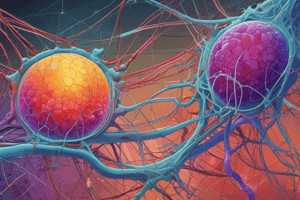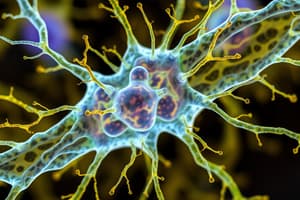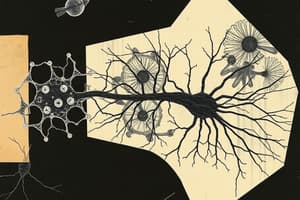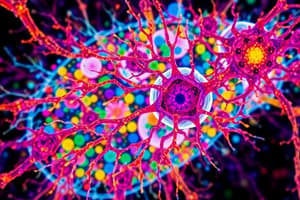Podcast
Questions and Answers
What role do microtubules play during cell division?
What role do microtubules play during cell division?
- They segregate chromosomes to ensure proper distribution. (correct)
- They polymerize to form actin filaments.
- They provide mechanical strength to the cell.
- They assist in the transport of cargo within the cell.
Which of the following is a characteristic unique to actin filaments?
Which of the following is a characteristic unique to actin filaments?
- They primarily provide structural support to the cell.
- They have a diameter of 7-8 nm. (correct)
- They are thick filaments compared to microtubules.
- They are involved in establishing the mitotic spindle.
What is the primary function of accessory proteins in the cytoskeleton?
What is the primary function of accessory proteins in the cytoskeleton?
- To facilitate the response to environmental stimuli.
- To regulate the assembly of cytoskeletal filaments at specific locations. (correct)
- To transport nutrients across the cell membrane.
- To increase the rigidity of the cell structure.
How do motor proteins relate to the cytoskeleton?
How do motor proteins relate to the cytoskeleton?
What overall characteristics do all three families of cytoskeletal filaments provide to the cell?
What overall characteristics do all three families of cytoskeletal filaments provide to the cell?
What primary function do actin filaments serve in a cell?
What primary function do actin filaments serve in a cell?
Which function is NOT associated with the cytoskeleton?
Which function is NOT associated with the cytoskeleton?
How do microtubules primarily contribute to the organization of a cell?
How do microtubules primarily contribute to the organization of a cell?
Which structure can the cytoskeleton form that is essential for cell movement?
Which structure can the cytoskeleton form that is essential for cell movement?
What role does the cytoskeleton play during cytokinesis?
What role does the cytoskeleton play during cytokinesis?
Which of the following best describes the cytoskeleton?
Which of the following best describes the cytoskeleton?
What is a significant function of the cytoskeleton related to the cell's layout?
What is a significant function of the cytoskeleton related to the cell's layout?
Which feature of the cytoskeleton contributes to endocytosis?
Which feature of the cytoskeleton contributes to endocytosis?
Flashcards are hidden until you start studying
Study Notes
Introduction to the Cytoskeleton
- The cytoskeleton is a complex and dynamic network of protein fibers that extend throughout the cytoplasm of a cell
- It provides structural support, motility, and regulation for the cell, acting as the cell's skeleton and muscle
- The cytoskeleton holds organelles in place, moves them, and aids in cell movement.
Functions of the Cytoskeleton
- Provides shape for the cell
- Offers protection by resisting deformation
- Allows cells to migrate by actively contracting and deforming
- Plays a role in many cell signaling pathways
- Involved in endocytosis, the uptake of extracellular material
- Separates chromosomes during cell division and the cytokinesis stage
- Acts as scaffolding to organize cell components and facilitate intracellular transport
- Can form a template for cell wall construction
- Creates specialized structures such as flagella, cilia, lamellipodia, and protostomes
Types of Cytoskeletal Filaments
- Actin Filaments (Microfilaments):
- Determine the shape of the cell's surface
- Necessary for whole-cell locomotion
- Drive the pinching of one cell into two during cell division
- Microtubules:
- Determine the positions of membrane-enclosed organelles
- Direct intracellular transport (act as tracks for kinesin and dynein)
- Form the mitotic spindle that segregates chromosomes during cell division
- Bind different MAPs (microtubule-associated proteins), microfilaments, and intermediate filaments to maintain cell shape
- Intermediate Filaments:
- Provide mechanical strength
Shared Features of Cytoskeletal Filament Systems
- All contribute to the cell's strength, shape, and ability to move
- All interact with hundreds of accessory proteins that regulate and link filaments to other cell components
Accessory Proteins
- Accessory proteins are essential for the controlled assembly of cytoskeletal filaments
- They include motor proteins, which convert ATP hydrolysis energy into mechanical force to move organelles along filaments or move the filaments themselves
Microfilaments (Actin Filaments)
- Helical polymers of the protein actin
- Polymerize to form long and thin fibers
- Diameter: 7-8 nm
- Represent the active or motile part of the cytoskeleton
Studying That Suits You
Use AI to generate personalized quizzes and flashcards to suit your learning preferences.




